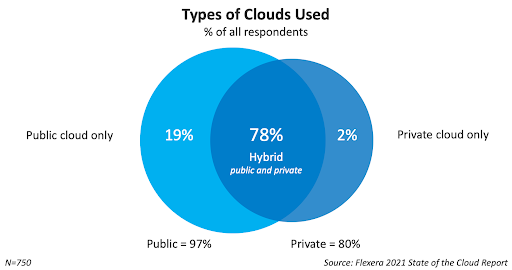More than 70 per cent of companies accelerated their digital transformation plans by at least a year, with the cloud being a key driver of such developments.

Cloud computing has evolved as an innovation in the computing field, providing a realm of opportunities for organisations, with benefits such as flexibility, scalability, availability, and cost-saving.
To encourage the adoption of cloud computing among business organisations in Saudi Arabia, IT leaders need to understand the effective strategies for gaining a relative advantage. Leaders from the manufacturing industry in Saudi Arabia, such as ABB group for its Electric Vehicle Charging Infrastructure’s Measurement and Analytics have been seen welcoming cloud computing to gain a cost-saving benefit. Oil and gas company Aramco combined the prowess of cloud computing with IoT for a more insight-driven decision making through analytics. The company partnered with Google to bring its cloud services to the Kingdom.
Cloud computing represents a significant area of future investment in information and communication technology (ICT) in Saudi Arabia. Using new ICTs is essential for expanding economic opportunities promoting the Saudi government’s 2030 vision. But decision-makers play a significant role in the adoption of cloud computing.
Saudi Arabia’s Vision 2030 mainly focuses on the digital transformation of the government functioning. A cloud-first approach helps to increase service quality, reduce total cost of ownership, improve cybersecurity robustness, and improve interoperability in relation to other entities. E-government services are set in motion to cut expenses, expand facilities, save time, and improve overall effectiveness and performance in the public sector.
The lack of knowledge about cloud computing is the main barrier for decision-makers to adopt this innovation in their organisations. Understanding the strategies that IT leaders have used to reduce IT costs was essential to encourage the adoption decision of cloud computing in Saudi Arabia.
How It Developed
Saudi Arabia adopted cloud computing to further reduce their IT costs, especially many different manufacturing companies in the Eastern region of Saudi Arabia. As the world went indoors, enterprises moved to the cloud, and essentially so, reputed companies moved their operations to the cloud, including Saudi Aramco in partnership with Google Cloud, STC and AliBabaCloud.
Saudi-based small and medium enterprises (SMEs) have already begun to embrace cloud computing to meet their technology needs. According to a survey by QuantAlign Research, more than a quarter of businesses have plans to deploy a combination of on-premise/dedicated private clouds, various public clouds, and legacy platforms.
In addition to such adoptions, a cloud-first policy has been implemented within the Kingdom of Saudi Arabia. This strategy aims to speed up the transition of government agencies from conventional IT solutions to cloud-based solutions.
The implications seen were a positive social change, including the potential to ensure the prosperity of the local economy by ensuring business sustainability of the firms across industries, resulting from implementing cost-saving strategies associated with cloud computing adoption.

The public cloud sector bloomed when Amazon Web Services started providing its services a decade ago, and now the industry seems to be growing ever since. The Saudi Arabia cloud computing market is expected to generate a compound annual growth rate (CAGR) of 35.5 per cent between 2021-2030.
Saudi Arabia is building a futuristic megacity from scratch named NEOM, a $500 billion city to be run by artificial intelligence and funded by the kingdom’s sovereign-wealth fund. Aiding the same, NEOM Tech announced Oracle as the first tenant of its hyperscale data centre at NEOM. The Oracle Cloud Infrastructure (OCI) is hosted at the data centre, providing a high-performing, resilient foundation for cloud services. The established data centre aims to not only attract global businesses by creating a powerful platform for knowledge exchange, but also empower innovators to pilot their ideas at scale inside the Kingdom.
Current Adoptions
Recently, mCloud Technologies, a provider of AI-powered asset management and Environmental, Social, and Governance (ESG) solutions, signed an agreement with Virtual Vision (V2), a local provider of cloud computing services within Saudi Arabia, to host the company’s AssetCare solutions on the V2 Public Cloud for use in the Kingdom.
Even Saudi Arabia’s Tourism Development Fund (TDF) completed a major Oracle Cloud implementation supporting the organisation’s objective of enabling investors and driving the development of Saudi’s tourism sector. The implementation spans across Oracle Software as a Service (SaaS), Platform as a Service (PaaS) and Infrastructure as a Service (IaaS) cloud solutions, designed significantly to drive automation and integration of TDF’s core functions, including core banking, finance, human resources and procurement.
By implementing a cloud-first strategy, TDF seems to be driving data integration and unified business processes by implementing a cloud-first strategy, which resulted in several benefits such as increased productivity, reduced costs, and improved controls said the statement from Oracle.
Cloud aggregator AlJammaz Technologies partnered with Hewlett Packard Enterprise (HPE) to distribute edge-to-cloud solutions across the HPE portfolio, including Compute, Storage, Software and Intelligent Edge.
Through this agreement, both organisations plan to jointly develop and enable their partner ecosystem to deliver next generation edge-to-cloud empowered solutions from HPE to support the digitisation of the economy in Saudi Arabia in line with Saudi Vision 2030. By working with HPE, AlJammaz is looking to help accelerate its partners’ digital transformation journeys and help them stay ahead of what is next.
Focusing more on confidentiality, integrity, and availability could help increase every enterprises’ security and trust and even the government over the cloud. Encouraging cloud-first policy further, establishing a cloud-computing regulation framework, and observing cloud security protocols and compliance are now being seen as the main focus of Saudi Arabian organisations, which in turn are aiding to smoothen enterprises’ cloud-first digital transformation goals.
More than 70 per cent of companies accelerated their digital transformation plans by at least a year, with the cloud being a key driver of such developments. It will only be interesting to see what further fuels the cloud sector developments in Saudi Arabia as cloud technology is constantly evolving.
If you liked reading this, you might like our other stories
How The Saudi Government Is Giving A Digital Push
Here’s Why Saudi Arabia Is A Digital Riser









